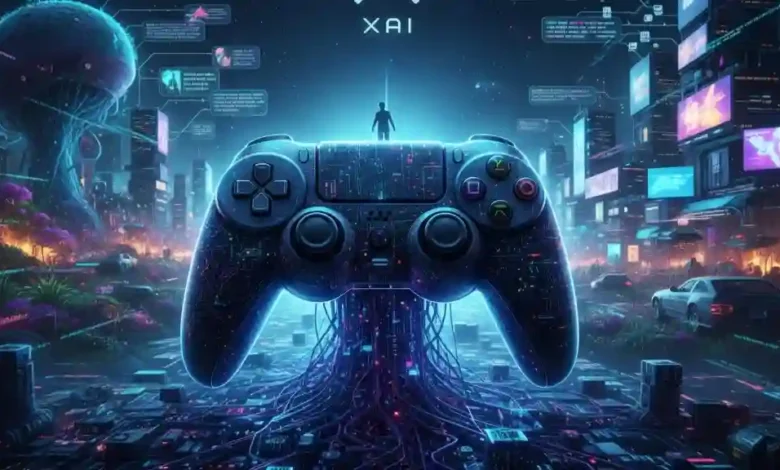Elon Musk’s XAI and The Dawn of AI-Generated Gaming

Elon Musk, a name synonymous with pushing the boundaries of innovation, has once again sent ripples through the tech world with a bold declaration about gaming. The XAI game studio, a new venture under his expansive umbrella, is poised to release a groundbreaking, AI-generated game before the close of next year. This announcement isn’t just news; it’s a seismic event that promises to redefine the landscape of interactive entertainment.
The Genesis of XAI: Musk’s Vision for Gaming
While details about XAI have been scarce, Musk’s pronouncements offer a glimpse into a future where artificial intelligence isn’t just a tool for optimization, but the very crucible of creation. XAI isn’t merely developing games with AI; it’s empowering AI to develop games itself. This distinction is crucial, hinting at a paradigm shift where game narratives, mechanics, art, and even entire virtual worlds could be conjured into existence by sophisticated algorithms.
Imagine a game that constantly evolves, not through pre-programmed updates, but through an AI that learns from player interactions, generates new quests, designs unique environments, and even crafts personalized storylines. This is the promise of XAI, and it’s a vision that aligns perfectly with Musk’s ambition to accelerate humanity’s journey towards a multi-planetary, AI-driven future.
What Does “AI-Generated” Truly Mean?
The term “AI-generated game” is loaded with implications. It suggests a departure from traditional game development cycles, which are often lengthy, resource-intensive, and limited by human imagination and labor. With AI at the helm, the possibilities are virtually limitless:
- Infinite Content Generation: No more finite game worlds. An AI could perpetually generate new levels, characters, items, and quests, ensuring endless replayability.
- Dynamic Storytelling: AI could craft emergent narratives that adapt to player choices, creating truly personalized and unpredictable storylines. Think of a game where the antagonist isn’t a static character but an AI that learns your strategies and develops countermeasures.
- Procedural Art and Design: From lush alien landscapes to intricate cityscapes, AI could design breathtaking visuals and soundscapes, constantly offering novel aesthetic experiences.
- Adaptive Difficulty and Personalization: The game could dynamically adjust its difficulty, pacing, and even content to suit individual player preferences and skill levels.
- Emergent Gameplay Mechanics: AI could even invent new rules and interactions within the game world, leading to unexpected and innovative gameplay.
The Unseen Revolution: Impact on the Gaming Industry
The release of an XAI-generated game could send shockwaves across the entire gaming industry:
- Democratization of Game Development: Could AI tools eventually empower smaller studios or even individual creators to produce high-quality games without massive teams and budgets?
- A New Era for Player Engagement: Games that constantly surprise and adapt could redefine player expectations, making static, linear experiences feel dated.
- Ethical Considerations: As AI takes on a more creative role, questions about authorship, intellectual property, and even the potential for AI-generated biases in game content will undoubtedly arise.
- The Rise of “Living” Games: We might be on the cusp of experiencing games that feel less like pre-designed products and more like evolving digital ecosystems.
Beyond the Hype: Challenges and Skepticism
While the prospect is thrilling, the road to truly great AI-generated games is fraught with challenges. The current state of AI, while impressive, still struggles with nuanced storytelling, genuine creativity, and maintaining coherence over extended narratives. Critics might argue that true artistic vision requires human intuition and empathy, qualities that AI has yet to fully replicate.
Will XAI’s first offering be a technical marvel or a truly compelling interactive experience? The balance between algorithmic generation and human-centric design will be crucial. The goal isn’t just to generate content, but to generate meaningful content that resonates with players.
What to Expect Before the End of Next Year
Musk’s ambitious timeline suggests that XAI has been working in stealth for some time, possibly leveraging advancements from other XAI endeavors, such as large language models and advanced generative AI. While the specific genre or style of the game remains a mystery, one can speculate:
- Science Fiction/Exploration: Given Musk’s fascination with space and the future, a game set in an expansive, AI-generated universe seems plausible.
- Strategic/Simulation: AI excels at complex calculations and system management, making strategy or simulation games a strong candidate.
- Puzzle/Narrative-Driven: An AI could generate intricate puzzles or branch out into a choose-your-own-adventure style narrative with unprecedented depth.
Regardless of the specifics, we can anticipate a game that showcases the power of AI in ways we haven’t seen before. Expect unique mechanics, unpredictable events, and a level of dynamic content that sets a new benchmark.
The Future is Now: Prepare for the XAI Revolution
Elon Musk’s announcement is more than just a marketing ploy; it’s a declaration of intent. XAI aims to do for gaming what SpaceX did for rocketry and Tesla for electric vehicles: disrupt, innovate, and accelerate progress. The release of an AI-generated game before the end of next year isn’t just a promise; it’s an invitation to witness the next frontier of interactive entertainment.
Get ready. The game, as we know it, is about to change forever.
For more Odinozz gaming articles, click here.
Follow Odinozz on social media. Click here.



